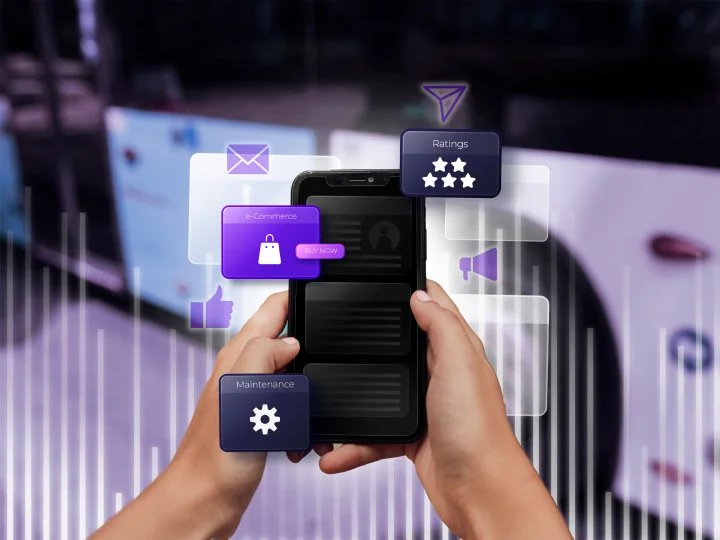
AI has undeniably wielded a profound influence over the tech world, catalyzing unprecedented transformations across every facet of technology. AI’s imprint is indelible from healthcare to transportation, entertainment to finance. In healthcare, it enables diagnosis and treatment recommendations at unimaginable speeds, while self-driving cars rely on AI to navigate complex environments. Even creative endeavors have yet to be spared, with AI-driven art and music composition pushing boundaries.
Chatbot technology stands at the nexus of AI’s impact, a domain where AI’s prowess shines brilliantly. Powered by the latest AI technology, Chatbots have become indispensable business tools. They optimize customer interactions, troubleshoot issues, and enhance user experiences. At axiusSoftware, we embrace this technological revolution, assisting companies in harnessing the full potential of AI-powered chatbots.
This exploration will delve into the intricate world of chatbot application development, dissecting the latest AI technology’s role in shaping these virtual conversational agents. But before delving into the specifics, let’s begin with a fundamental question:
What is an AI ChatBot?
An AI chatbot is a computer program designed to simulate human-like conversations with users through text or speech.
It leverages the latest AI technology to understand and respond to user queries, providing information, assistance, or performing tasks autonomously. Chatbot application development has propelled these virtual agents into diverse roles across industries.
For instance, consider a customer support chatbot for an e-commerce platform. This AI chatbot is equipped with the latest AI technology to engage customers effectively. When a user initiates a conversation, the chatbot can comprehend the query, whether it’s about product inquiries, order tracking, or returns. It uses natural language processing (NLP) algorithms to understand the user’s intent and extract relevant information.
In a real-time customer conversation:
User: “Hi, I’d like to track my recent order.”
AI Chatbot: “Certainly! Please provide your order number, and I’ll check your status.”
User: “My order number is #12345.
AI Chatbot: “Thank you. Your order (#12345) is currently in transit and is expected to be delivered within 2 days. Is there anything else I can assist you with?”
This example demonstrates how the latest AI technology enables chatbots to interpret user queries, access relevant data, and deliver accurate responses swiftly, enhancing customer experiences and streamlining interactions in various domains like customer support, sales, and information retrieval.
What are the Benefits of AI ChatBots?
AI chatbots offer a versatile and powerful solution to improve customer service, streamline operations, and drive business growth across various domains, thanks to their 24/7 availability, cost-efficiency, consistency, scalability, and ability to deliver instant responses while collecting valuable data and offering personalized experiences.
They offer a plethora of benefits across various industries and applications. Here’s a list of key advantages, along with detailed explanations for each point:
24/7 Availability:
AI chatbots are available round-the-clock, ensuring customers can access assistance or information anytime. This uninterrupted service improves customer satisfaction and accessibility.
Cost-Efficiency:
Chatbots significantly reduce operational costs as they can handle a high volume of inquiries simultaneously without requiring additional staff. This cost-effective solution is precious for businesses.
Consistency:
Chatbots deliver consistent responses regardless of the user’s mood or workload, maintaining a high level of service quality. This consistency contributes to building trust and reliability.
Scalability:
They can easily scale to handle growing demands without a proportional resource increase. This scalability is crucial for businesses experiencing fluctuating workloads.
Instant Responses:
AI chatbots provide instantaneous answers to user queries, enhancing user experiences by minimizing wait times. This speed is essential in industries like e-commerce and customer support.
Data Collection and Analysis:
Chatbots can collect and analyze user data, providing valuable insights into customer preferences and behavior. This data-driven approach helps businesses tailor their services and products.
Multilingual Support:
AI chatbots can communicate in multiple languages, facilitating global reach and catering to a diverse customer base, which is essential for international businesses.
Reduced Human Error:
Automation reduces the likelihood of human errors in customer interactions, ensuring accurate information delivery and minimizing potential mishaps.
Personalization:
Advanced chatbots leverage AI to personalize interactions based on user history and preferences. This tailored approach enhances customer engagement and satisfaction.
Enhanced Productivity:
By handling routine tasks, chatbots free up human agents to focus on more complex and value-added activities, improving overall workforce productivity.
Improved Lead Generation:
In sales and marketing, chatbots can qualify leads, gather contact information, and initiate follow-up, streamlining the lead generation process.
Customer Insights:
Chatbots can gather feedback and customer sentiment, providing businesses with actionable insights for continuous improvement.
What are the Challenges of the Tech?
AI chatbot technology, while promising, faces several challenges that require careful consideration:
Natural Language Understanding:
Understanding the intricacies of human language, including slang, colloquialisms, and context, remains a significant challenge. Ensuring chatbots can accurately interpret user queries is crucial for effective communication.
Personalization:
While personalization is a benefit, it’s also a challenge. Striking the right balance between providing personalized responses and respecting user privacy can take time and effort.
Training and Data:
Developing and training chatbots necessitates large datasets and continuous updates to stay relevant and accurate. Gathering and maintaining high-quality training data can be resource-intensive.
Handling Complex Queries:
Chatbots often struggle with complex or nuanced queries that require human-level understanding or empathy. Resolving such queries effectively remains a challenge.
Scalability:
As chatbots gain popularity, ensuring they can scale to handle a growing user base while maintaining performance and quality is challenging.
User Acceptance:
Users may resist or mistrust chatbot interactions, preferring human assistance. Convincing users of the chatbot’s capabilities and benefits can take time and effort.
Maintenance and Updates:
Maintenance and updates are essential to keep chatbots effective and up-to-date. Neglecting this aspect can lead to performance degradation.
Our team of experts at axisSoftware handles these challenges via ongoing research, development, and a deep understanding of user needs and expectations. Overcoming these obstacles is essential to unlock the full potential of AI chatbot technology across industries.
Book a free consultation with one of our experts today to learn more about ChatBot development and how it can help your business.
What are the Emerging Trends in AI ChatBot Technology?
Emerging trends in AI chatbot technology are shaping the future of conversational AI and its applications:
Multimodal Capabilities:
Chatbots are evolving to support not only text but also voice and visual inputs, offering more versatile and immersive interactions through voice recognition, image recognition, and video capabilities.
Emotion Recognition:
Advanced chatbots are becoming more adept at recognizing user emotions through tone analysis, enabling them to respond empathetically and adapt to user sentiments.
Hyper-Personalization:
AI chatbots are increasingly capable of delivering highly personalized experiences by analyzing user data and preferences and tailoring responses and recommendations accordingly.
AI-powered Search:
Chatbots integrate advanced search capabilities, allowing users to search for specific information or products within a conversation, enhancing usability and convenience.
AI Ethics and Bias Mitigation:
There is a growing emphasis on addressing ethical concerns and bias in chatbot interactions, ensuring fairness, transparency, and responsible AI deployment.
AI-powered Chatbot Development Platforms:
Developers can now access more sophisticated chatbot development platforms with pre-built models and tools for easier and faster chatbot creation.
Conversational AI in Healthcare:
The healthcare industry is adopting chatbots for patient engagement, appointment scheduling, and health monitoring, improving healthcare accessibility and efficiency.
Chatbots for Mental Health:
Mental health chatbots are on the rise, offering support, guidance, and crisis intervention to users in need, particularly in remote or underserved areas.
Chatbots in Education:
Chatbots are being leveraged in educational settings to provide personalized tutoring, answer student queries, and facilitate interactive learning experiences.
Chatbots in eCommerce:
eCommerce chatbots enhance customer experiences by offering product recommendations, virtual shopping assistants, and streamlined checkout processes.
AI Chatbots in Customer Service:
AI-powered chatbots continue to transform customer service by handling routine inquiries, reducing wait times, and improving overall customer satisfaction.
These trends reflect AI chatbots’ evolving capabilities and expanding applications, positioning them as powerful tools for businesses across industries to enhance user experiences, drive efficiency, and provide valuable insights. We can expect even more exciting developments in AI chatbot technology as technology advances.
Conclusion
In chatbot application development, the latest AI technology is the cornerstone of innovation. At axiusSoftware.cn, we leverage AI, ML, and IoT solutions to craft cutting-edge chatbots that transform customer experiences. Explore our services and stay at the forefront of technological advancement. Visit our site today for more information.











